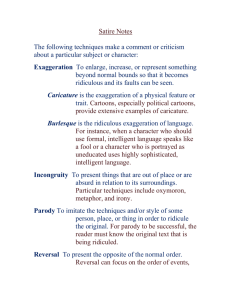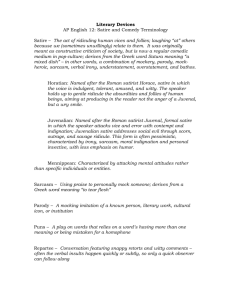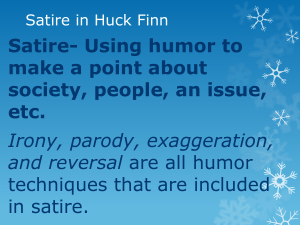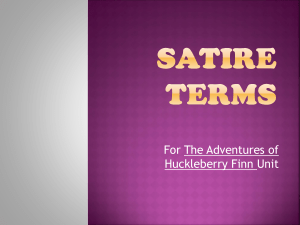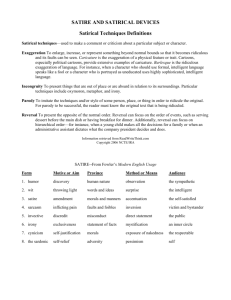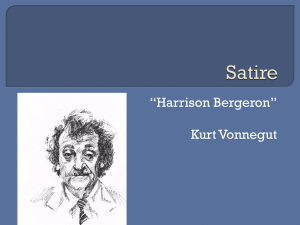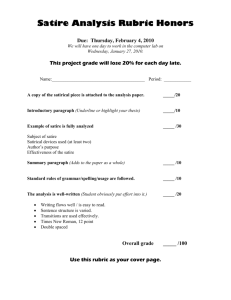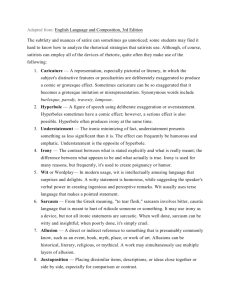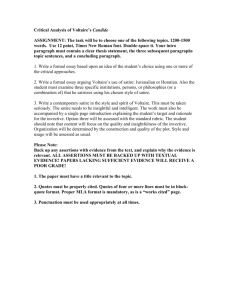SATIRE AND SATIRICAL DEVICES Satire—sarcasm, irony or wit
advertisement
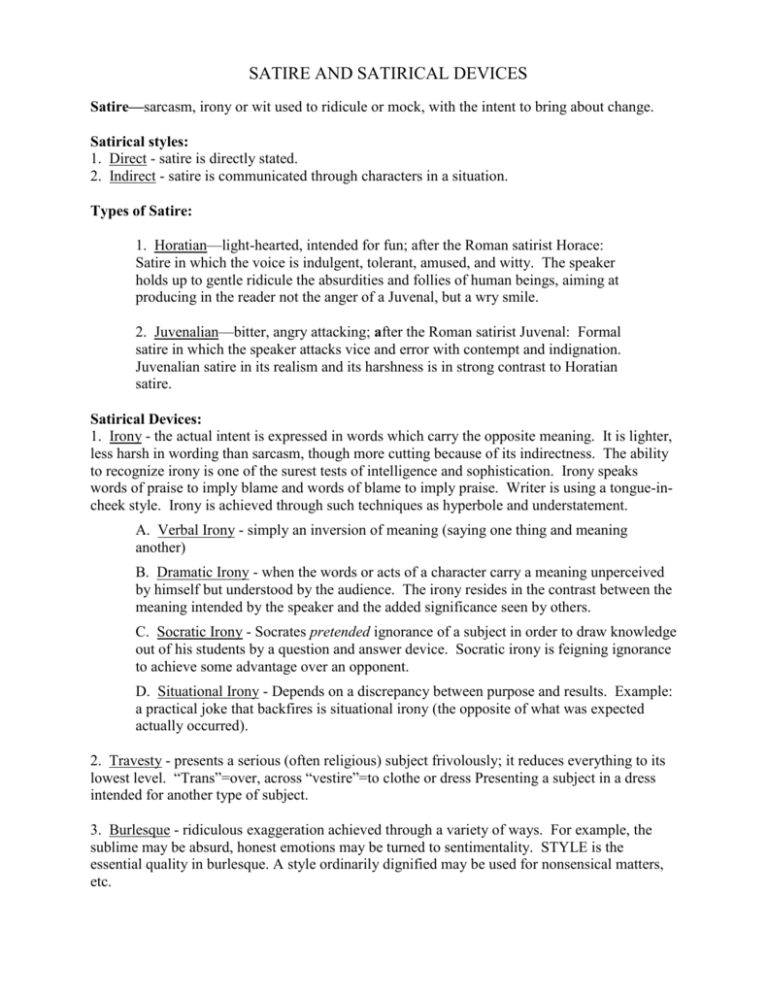
SATIRE AND SATIRICAL DEVICES Satire—sarcasm, irony or wit used to ridicule or mock, with the intent to bring about change. Satirical styles: 1. Direct - satire is directly stated. 2. Indirect - satire is communicated through characters in a situation. Types of Satire: 1. Horatian—light-hearted, intended for fun; after the Roman satirist Horace: Satire in which the voice is indulgent, tolerant, amused, and witty. The speaker holds up to gentle ridicule the absurdities and follies of human beings, aiming at producing in the reader not the anger of a Juvenal, but a wry smile. 2. Juvenalian—bitter, angry attacking; after the Roman satirist Juvenal: Formal satire in which the speaker attacks vice and error with contempt and indignation. Juvenalian satire in its realism and its harshness is in strong contrast to Horatian satire. Satirical Devices: 1. Irony - the actual intent is expressed in words which carry the opposite meaning. It is lighter, less harsh in wording than sarcasm, though more cutting because of its indirectness. The ability to recognize irony is one of the surest tests of intelligence and sophistication. Irony speaks words of praise to imply blame and words of blame to imply praise. Writer is using a tongue-incheek style. Irony is achieved through such techniques as hyperbole and understatement. A. Verbal Irony - simply an inversion of meaning (saying one thing and meaning another) B. Dramatic Irony - when the words or acts of a character carry a meaning unperceived by himself but understood by the audience. The irony resides in the contrast between the meaning intended by the speaker and the added significance seen by others. C. Socratic Irony - Socrates pretended ignorance of a subject in order to draw knowledge out of his students by a question and answer device. Socratic irony is feigning ignorance to achieve some advantage over an opponent. D. Situational Irony - Depends on a discrepancy between purpose and results. Example: a practical joke that backfires is situational irony (the opposite of what was expected actually occurred). 2. Travesty - presents a serious (often religious) subject frivolously; it reduces everything to its lowest level. “Trans”=over, across “vestire”=to clothe or dress Presenting a subject in a dress intended for another type of subject. 3. Burlesque - ridiculous exaggeration achieved through a variety of ways. For example, the sublime may be absurd, honest emotions may be turned to sentimentality. STYLE is the essential quality in burlesque. A style ordinarily dignified may be used for nonsensical matters, etc. 4. Parody - a composition imitating or burlesquing another, usually serious, piece of work. Parody is designed to ridicule, in nonsensical fashion, an original piece of work. Parody is in literature what the caricature and cartoon are in art. **NOTE** TRAVESTY, BURLESQUE & PARODY are similar, but travesty always makes a mockery of a serious subject, whereas burlesque and parody may do the reverse. 5. Farce - exciting laughter through exaggerated, improbable situations. This usually contains low comedy: quarreling, fighting, coarse wit, horseplay, noisy singing, boisterous conduct, trickery, clownishness, drunkenness, slapstick. 6. Invective - harsh, abusive language directed against a person or cause. Invective is a vehicle, a tool of anger. Invective is the bitterest of all satire. 7. Sarcasm - a sharply mocking or contemptuous remark. The term came from the Greek word “sarkazein” which means “to tear flesh.” 8. Knaves & Fools - in comedy there are no villains and no innocent victims. Instead, there are rogues (knaves) and suckers (fools). The knave exploits someone “asking for it.” Comic satire results when these two interact. When knaves & fools meet, they expose each other. 9. Malapropism - a deliberate mispronunciation of a name or term with the intent of poking fun. Background - KEY Authors (To Be Studied In Class) Jonathan Swift – [view PPT presentation] Alexander Pope – [ view PPT presentation] Voltaire – [view PPT presentation] Kurt Vonnegut – [view link] Joseph Heller – [view link]
